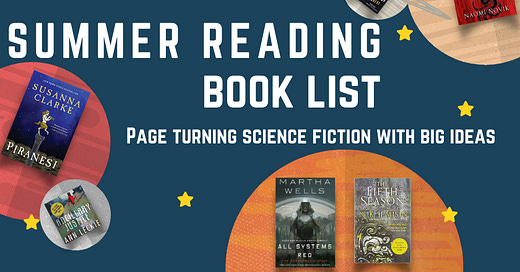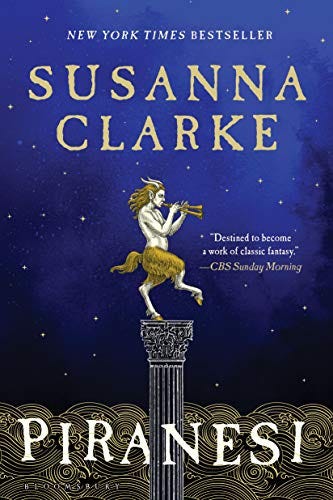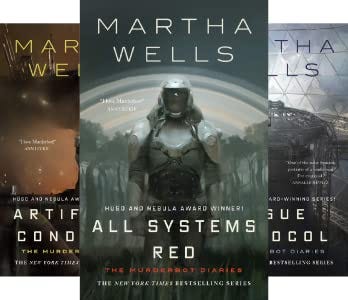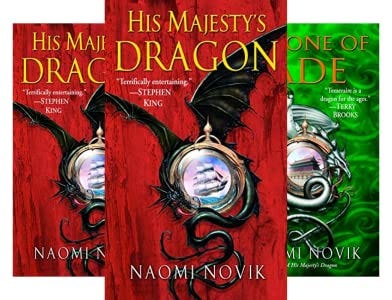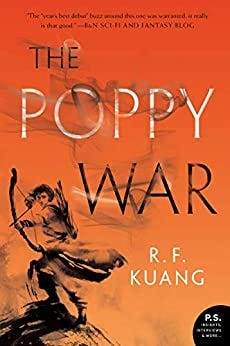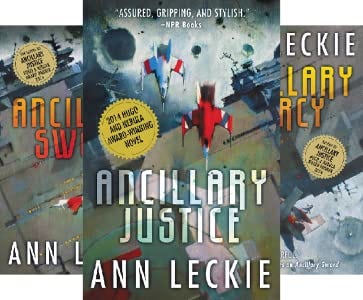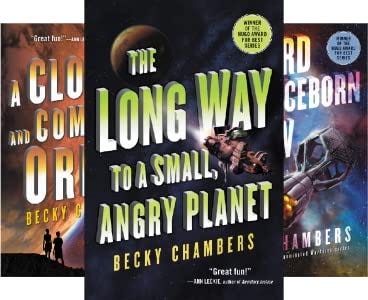Seven Modern Science Fiction Books: Page Turnings Reads with Big Ideas
My recent reads and why I have prioritized female science fiction authors in my library
The most enduring hobby I’ve had over my life is a love of reading. Whether it was college or early career or the time with newborns when most of my personal life stopped, I’ve always kept up the habit of reading before bedtime even as other things went by the wayside. This is a habit we hope to pass on to our own kids and I’ve talked about this a few times before in The Gifts We Hope to Give as well as How We Approach Reading to Our Kids.
Over the past decade, I’ve gravitated more towards science fiction. I figured it was just the techie in me who likes spaceships and light swords. However, I was discussing it recently with a leadership coach who was fitting me to a personality profile. He asked me if I like to dream about big ideas more than others, did I create my own worlds when I was a kid, and if my self-defense mechanism under stress was to retreat from reality and process on my own time. And then he asked me if I liked to read science fiction. This was an “Aha!” moment as to why this has been my durable pastime: More than others, I process my own life through the lens of exploring fantastical ideas and I recharge by escaping into the narratives of other lives.
In any case, who doesn’t like a good list of book recommendations, especially with the weather turning nice and vacation plans back again thanks to the vaccination campaigns. Here’s what I’ve read recently. All of these are fun, engrossing “Summer Reads” – quick page turners that will pull you in but also leave you with some new perspectives and mind-expanding thoughts. Who has time to choose between pulp and reflective literature? Read these and you can get both!
Susanna Clarke’s Piranesi
Premise: What if there was someone trapped in a mysterious world with seemingly little purpose but to explore and map it? Start your journey from the same veil of ignorance as the narrator and unlock the mysterious puzzle of the world, and the book’s purpose, alongside the characters.
Keywords: Progressive disclosure world-building, sins of our fathers motif, can-you-trust-the-narrator themes
What I’ll remember: The writing style & premise is so fully immersive – my quest to understand this world was inhibited by the narrator’s lack of legitimacy as a mentally stable truth teller. For anyone who likes to explore worlds and feel a personal attachment to them, this book is the master class.
Other things you should know: Just nominated for this year’s Hugo award. Also, a short read, almost a novella.
Martha Well’s Muderbot Series
Premise: What if a soldier-robot with terrifying amount of violence potential became self-aware? Join them on their journey as they explore their relationship to morality and taming of their own inner demons. Also, the robot is the most sarcastic introvert you will ever meet.
Keywords: Clever and funny, saving others through violence, mind bending characters, fish-out-of-water trope.
What I’ll remember: The diary and inner monologue style that directly speaks to the reader works perfectly for the shockingly sarcastic and neurotic main character.
Other things you should know: Won many accolades, including the Hugo. The irrelevant tone reminds me of Christopher Moore’s Lamb: The Gospel According to Biff, Christ’s Childhood Pal. 6 books in series (and counting).
NK Jemisin’s Broken Earth Series
Premise: What if there was a world that experienced near-extinction climate destruction every 100 years and society’s survival depended on a class of people with terrifying abilities, where this class is both ostracized yet exploited for their power? Let us explore this from the perspective of the oppressed.
Keywords: Haves and have nots, expansive world building, book with its own vocabulary, technology from the forgotten past
What I’ll remember: It’s rare for a book to tackle both overarching concepts of power and class in society alongside deep and meaningful everyday struggles in the lives of the characters.
Other things you should know: All three books in the series won the Hugo Award for best novel.
Naomi Novik’s Temeraire Series
Premise: What if dragons existed during the Napoleonic wars and humans learned to tame them and create an “air force.” Also, the dragons can talk.
Keywords: Humorous, heartwarming, grand world building, lots of swashbuckling!
What I’ll remember: The development of the main character (a dragon!) from wide-eyed innocent to a warrior for justice for his kind.
Other things you should know: 10 books (!!) in the series. Also, I, too, still don’t know how to pronounce the series name.
R.F. Kuang’s Poppy War
Premise: What if you went down the familiar path of a coming-of-age chosen-one saga with a strong central female character but were not afraid to deeply explore inequality & justice as central themes instead of background noise?
Keywords: From outcast to chosen-one, the enemy threatens our existence, coming of age in a martial academy theme, hero’s journey and mysterious father figure tropes.
What I’ll remember: An imaginative and fresh take on the Hunger Games style “throw teenagers together and let them learn how to fight” novel. Feels very non-commercial in its sophistication and non-reductionist approach to the world and its problems. In particular, the enemies are more than just one-dimensional monsters. I found the non-Western based world refreshing.
Other things you should know: 3 books in series, although I have only read the first one
Ann Leckie’s Ancillary World Series
Premise: What if you set out to write a grand, planet-spanning empire building space opera that focuses less on the power dynamics of it all but more on the fight for justice from inequality and the power of people to define their own destiny?
Keywords: Space empires, justice through violence, “never tell me the odds,” AI & human co-existence
What I’ll remember: A uniquely empathetic, justice-oriented perspective on the space empire trope.
Other things you should know: Only novel ever to sweep the Hugo, Nebula, and Arthus C. Clarke awards. 3 books in series.
Becky Chamber’s Wayfarers series, starting with The Long Way to a Small Angry Planet
Premise: What if you took a completely standard “rag-tag, close knit spaceship crew must complete a crazy job for a score of a lifetime” plot but infused it with a world that made us reflect on our own social biases on gender, race, and equality?
Keywords: Space opera, this-type-of-alien-makes-a-point-about-us-as-humans, society from the view of the underdog and downtrodden
What I’ll remember: The exploration of gender identity and our own biases by introducing a world and race of aliens so very much unlike our own that it makes us reflect on why our world must be the way it is
Other things you should know: 4 books (and counting) in series. The first novel in this series was self-published after a Kickstarter campaign.
Coda on Privilege
We conclude every Mind the Beet post with a reflection on privilege and allyship. You may have noticed something about the list I provided here – all the choices are from female science fiction authors and represent a collection of diverse backgrounds. On the one hand this shouldn’t be surprising – women swept the list of Hugo award nominees in 2020 – although sadly only two women authors are in the the top 30 science fiction books on Amazon right now.
There are more reasons though why I’ve prioritized women and diverse voices in my library these past couple years. As a tech industry, we must make more progress in recruiting and retaining a workforce that represents our customers – that’s not true today and it’s an urgent priority to empower women and underrepresented minorities in engineering and decision-making roles throughout our industry. I talk about this more in my 15 year career retrospective when I mention that allyship, empathy, vulnerability are the key to modern leadership. This is how we create a way for more people to thrive in their careers so more diverse voices are listened to.
This is not “just another” problem to tackle in our industry; it’s the most important one. We’ve already seen the far-reaching impact of technology on society, economic disruption, and information flow and we need to make constant progress on bringing in many perspectives if we are to remain the most important industry on the planet.
One of the ways I practice this is by trying to incorporate diverse perspective into my everyday routines. The Better Allies newsletter is a great resource, but I also found that prioritizing authors who are different than myself in my reading list has been a great way of getting a drip, drip, drip of empathy that changes norms and habits. Every one of these books explores ideas that are central to the lived experience of women in our industry or society at large, such as:
The notion of interacting in a world systemically designed for someone else’s success.
Introspection about the impact of the use of violence vs. it is an assumed and unexplored fact of life.
An avoidance of the “lone wolf” trope and instead a constant quest for companionship and alliances.
Use of alternative world building to make us reflect on our biases on gender and equality.
In general, an intrinsic sense of caution about the world and its impact instead of an implied cruise control that comes with unearned and unexamined privilege
I don’t pretend that reading a couple books makes me the perfect ally. Quite the opposite – allyship’s core concept is about taking action towards meaningful change. But allyship is a journey and it starts with empathy for lived experiences other than your own. I speak 2-3 times a year at various diversity and inclusion panels and one of the points I like to make is this behavior change I took to prioritize female authors. I feel like my role in these forums is often to speak to a silent but sympathetic majority who are open to being spurred to action but need to figure out how to start. All too often people are intimidated by the notion that allyship must start with sacrifice or radical zero-sum tradeoffs. That’s a terrible way to start with a cause – or build a product for that matter. It starts with establishing learning and empathy and fit before growth and scale. So my advice for those beginning the allyship journey is to think carefully about the routines and habits you have and if you can incorporate more empathy for others’ lived experiences into them. Just see what it spurs you to do.
Let’s start a conversation
I have a favor to ask - if this list added something to your reading list - consider sharing this post out to your friends and colleagues. I found all of these reads because people recommended them to me on social media or Goodreads. You can even add your own book rec on the same theme (good page turners that also explore grand ideas) when you share.
You can tag me on Twitter with @AdamHarmetz or just Adam Harmetz on LinkedIn and Facebook.
More Essays From Mind The Beet
If this got forwarded to you, make sure to subscribe.
Here’s some other posts from Mind The Beet you may find interesting:
🎁 The Gifts We Hope to Give: The one question emerging leaders should be asking
👶 Advice on Hiring a Nanny: Practical tips for working parents
⌛ Where a Tech Product Leader Spends Their Time: Learn tips on career and time management
🤗 A Day In the Life of a Frontline Manager: Battle tested advice for new frontline managers
🎙 The Studio: A product guide to building a custom telepresence room
More of our essays are here: https://www.mindthebeet.com/writings. We strive for 🧠 nurturing essays on career, leadership, and parenting for 21st century grown ups and emerging leaders - with some product recs thrown in, too. Follow our Instagram for a deeper look at our slice of life.

